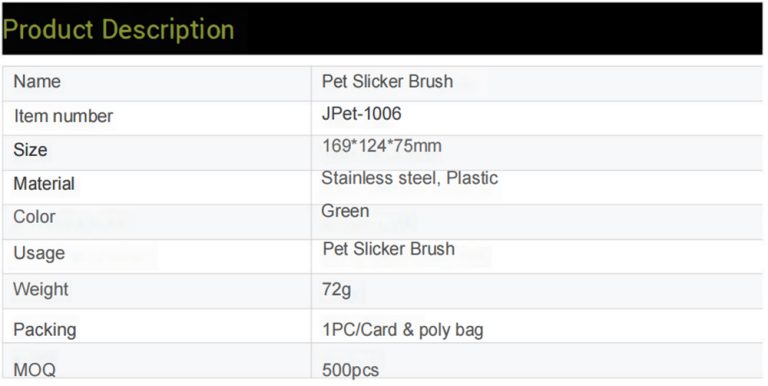Company
10 Ways Company Culture Impacts Employee Satisfaction and Productivity
Company culture plays a crucial role in shaping the overall satisfaction and productivity of employees. It encompasses the values, beliefs, and behaviors that define the work environment and the way employees interact with each other. A positive company culture can lead to higher employee morale, increased job satisfaction, and improved productivity. On the other hand, a toxic company culture can have detrimental effects on employee well-being and performance. In this article, we will explore 10 ways in which company culture impacts employee satisfaction and productivity.
| Name | Extra Long pet slicker brush |
| Item number | JPet-1011 |
| Size | S/M/L/XL |
| Material | ABS+TPR+Stainless Steel |
| Color | Green or Custom |
| Needle Diameter | 0.4mm/0.27mm |
| Pin Length | 0.7 inch (Can be customized up to 1 inch long -only the extra long thick needlebrush) |
| Weight | 78/85/117/140g |
| Packing | Blister Card |
| MOQ | 200pcs |
| Product Name | 3IN 1 pet grooming brush |
| Item No | JPet-1001 |
| Size | 95*98*33mm 100g |
| Colors | Green/Orange |
| Material | ABS+PC+Stainless Steel |
| Delivery time | 30-60days |
| OEM/ODM | Available |
| Name | Pet Grooming Kit |
| Item number | JPet-1007 |
| Feature | Sustainable |
| Material | ABS+TPR+Nylon+Stainless Steel |
| Color | White and black |
| ltem Type | BSCl,Sedex |
| Certificates | BSCl,Sedex |
| Packing | Color Box |
| MOQ | 500sets |
First and foremost, company culture sets the tone for how employees are treated within the organization. A culture that values respect, transparency, and open communication fosters a sense of trust and belonging among employees. This, in turn, leads to higher levels of job satisfaction and engagement. On the contrary, a culture that is characterized by micromanagement, favoritism, or lack of transparency can create a toxic work environment that erodes employee morale and motivation.
Secondly, company culture influences the level of employee engagement within the organization. Engaged employees are more likely to go above and beyond their job responsibilities, contribute innovative ideas, and collaborate effectively with their colleagues. A positive company culture that promotes employee engagement can lead to higher levels of productivity and creativity. Conversely, a disengaged workforce can result in decreased productivity, higher turnover rates, and lower overall performance.
Moreover, company culture plays a significant role in shaping the work-life balance of employees. A culture that values work-life balance and supports flexible working arrangements can help employees manage their personal and professional responsibilities more effectively. This, in turn, leads to higher levels of job satisfaction and well-being. On the other hand, a culture that promotes long working hours, unrealistic expectations, and a lack of support for work-life balance can lead to burnout, stress, and decreased productivity.

Additionally, company culture influences the level of collaboration and teamwork within the organization. A culture that promotes teamwork, collaboration, and mutual support can lead to higher levels of employee satisfaction and productivity. Employees are more likely to work together effectively, share knowledge and expertise, and achieve common goals when they feel supported by their colleagues and leaders. In contrast, a culture that fosters competition, silos, and individualism can hinder collaboration and teamwork, leading to decreased productivity and performance.
Furthermore, company culture impacts the level of employee recognition and appreciation within the organization. A culture that values recognition, appreciation, and feedback can help employees feel valued and motivated to perform at their best. Recognizing and rewarding employees for their contributions can boost morale, motivation, and job satisfaction. Conversely, a culture that lacks recognition, appreciation, and feedback can lead to disengagement, low morale, and decreased productivity.
In conclusion, company culture plays a critical role in shaping employee satisfaction and productivity. A positive company culture that values respect, transparency, engagement, work-life balance, collaboration, and recognition can lead to higher levels of employee satisfaction and performance. On the other hand, a toxic company culture that promotes micromanagement, favoritism, long working hours, competition, and lack of recognition can have detrimental effects on employee well-being and productivity. It is essential for organizations to prioritize building a positive company culture that supports the well-being and success of their employees.






